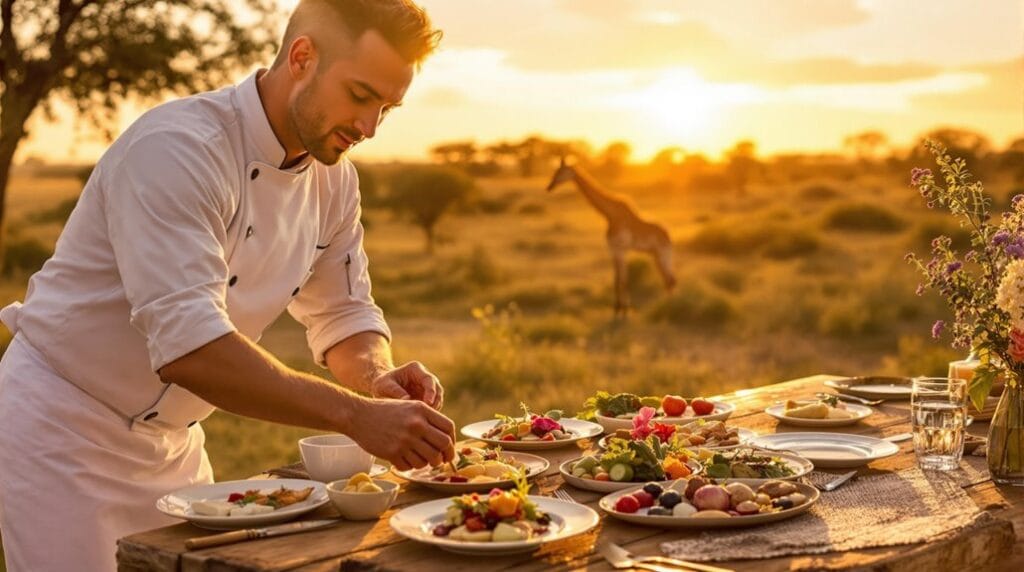When you consider the fabric of African culture, ancestral lineage emerges as a cornerstone, shaping identity and values. It's not just about tracing roots; it's about understanding how ancestors guide moral choices and community dynamics today. Rituals and communal practices reinforce this connection, yet modernization poses challenges to these traditions. How do younger generations reconcile these rich legacies with contemporary life? The answers might surprise you as they reveal profound insights into cultural resilience and transformation.
Key Takeaways
- Ancestral lineage provides moral guidance, shaping identities and community values that influence ethical behavior and social status.
- Rituals and offerings at ancestor altars enhance social cohesion and maintain connections to cultural heritage.
- Modernization and globalization threaten traditional practices, causing disconnection among younger generations from their ancestral roots.
- Revitalization efforts, including festivals and educational programs, empower youth to reclaim and integrate ancestral heritage into their lives.
- Technology facilitates intergenerational dialogue, promoting awareness and participation in cultural activities to strengthen community ties.
Significance of Ancestors in Culture
In many African cultures, ancestors are more than just figures from the past; they're seen as active moral guides who shape the lives of their descendants. You might notice that in traditional African religions, the reverence for ancestors creates a profound sense of belonging and identity. Ancestors aren't merely protectors; they're integral to the community's moral framework, influencing prosperity and well-being through their enduring presence.
This belief fosters a deep respect for lineage, connecting you to your roots and reinforcing community ties. By honoring ancestors, you engage with a rich tapestry of cultural continuity, where ancestral teachings provide valuable wisdom that guides your decisions and actions today.
Rituals and offerings, such as food and libations, serve to acknowledge their influence, reminding you that their legacy shapes social norms and community cohesion.
In this way, the significance of ancestors transcends individual families; it weaves a collective narrative that binds communities together. By maintaining these connections, you not only honor the past but also cultivate a vibrant cultural identity that can be passed down to future generations, ensuring that the teachings of your ancestors continue to resonate in everyday life.
Rituals and Practices of Ancestor Worship
Rituals and practices surrounding ancestor worship form an essential part of African cultural expression, showcasing deep-rooted beliefs about the connection between the living and the dead.
In many communities, you'll notice ancestor altars built in homes, acting as sacred spaces where families honor their ancestors. These altars become focal points for offerings of food, drink, and symbolic items, allowing for a direct line of communication with the spiritual domain.
Festivals dedicated to ancestors are vibrant occasions, emphasizing the importance of ancestral ties in fostering social cohesion. During these celebrations, rituals like libations and sacrifices reinforce the belief that ancestors serve as protectors and guides.
They remind you that the influence of your forebears extends into daily life, especially during significant events like births, marriages, and deaths. These moments often involve invoking ancestors, weaving their legacy into the fabric of contemporary experiences.
Ancestral Guidance in Daily Life
In your daily life, ancestral guidance shapes your decisions and actions, offering a moral compass that resonates deeply within your community.
Through rituals like food offerings at ancestor altars, you maintain an essential connection, inviting their wisdom into your choices and life events.
This ongoing dialogue with the past not only influences personal paths but also reinforces shared values and social cohesion among those around you.
Spiritual Influence on Decisions
Throughout the fabric of daily life in many African cultures, ancestors serve as essential moral compass points, shaping the decisions you make. Their teachings and legacies act as guiding forces, influencing your ethical choices. By maintaining a spiritual connection through rituals and offerings, you invoke their wisdom, especially during life's challenges.
When maneuvering significant events—like marriages or births—you often seek ancestral blessings. This guarantees harmony and success, reinforcing the crucial role ancestors play in traditional practices. Dreams hold deeper meanings too, as they're often viewed as messages from your ancestors, guiding personal and communal decisions.
To help you understand this spiritual influence, consider the following table:
| Aspect | Description |
|---|---|
| Moral Guidance | Ancestors offer ethical direction in daily choices. |
| Ritual Practices | Offerings invoke ancestral support during life events. |
| Community Leaders | Act as intermediaries, consulting ancestors for guidance. |
This interconnectedness emphasizes how the spiritual influence of ancestors enriches your decisions, fostering a sense of belonging and continuity within your culture.
Ritual Practices and Communication
Ancestral connections thrive through a variety of ritual practices that bridge the living and the spiritual domain. These rituals often involve offerings of food, drink, and symbolic items, reinforcing your bond with ancestors.
In your home, an ancestor altar becomes a crucial focal point, inviting communication and reverence during significant life events like births, marriages, and deaths.
Engaging in community festivals dedicated to ancestors not only honors your lineage but also fosters collective memory and cultural heritage. These gatherings create a sense of belonging, reminding you of shared history and values.
Spiritual guidance from your ancestors is sought through rituals such as libations and sacrifices, where you interpret dreams believed to convey their messages.
Everyday life is enriched by the teachings of ancestors, who act as moral regulators. Their legacies influence your ethical decision-making and strengthen community cohesion.
Impact on Community Identity
The role of ancestral lineage profoundly shapes community identity in many African cultures. By understanding your ancestral lineage, you gain insight into your place within the social fabric of your community. This knowledge not only defines your inheritance and social status but also fosters a sense of belonging that connects you to both your ancestors and fellow community members.
Ancestors are revered as spiritual guides, and their teachings greatly influence moral values and ethical behavior, molding the community identity. Your lineage determines communal responsibilities and roles, shaping decision-making processes and leadership structures. This interconnectedness guarantees that each member plays an essential part in maintaining the community's harmony and continuity.
Additionally, festivals and rituals dedicated to honoring ancestors serve to strengthen these communal bonds. They create opportunities for members to come together, celebrating shared heritage and collective identity.
In this way, ancestral lineage isn't just a historical reference; it's a living, breathing entity that nurtures community identity, instilling pride and unity. Embracing this aspect of African culture allows you to feel anchored, connected to a larger narrative of resilience and belonging.
Challenges to Ancestral Traditions
As you witness the rapid pace of modernization and globalization, you may notice how these forces challenge ancestral traditions that once held communities together.
Many young people are drifting away from their cultural heritage, resulting in weakened family ties and a loss of moral guidance.
This growing disconnect prompts important conversations about reviving ancestral values to restore integrity and cohesion in society.
Modernization and Globalization Effects
Modern society's relentless march towards modernization and globalization poses significant challenges to traditional practices surrounding ancestor worship in many African cultures. As you observe, younger generations increasingly embrace Western values, often at the expense of their cultural significance.
Traditional roles connected to ancestor veneration are diminishing, leading to a disconnect that erodes family ties and community cohesion. You might notice how increased exposure to global media and technology shifts moral accountability. This change fosters a perception of rising immorality, weakening the social fabric that once upheld ancestral teachings.
As traditional rituals fade, entire communities struggle to maintain their rich cultural heritage. The calls for a reawakening of ancestral values grow louder, as many seek to address contemporary societal issues rooted in disconnection.
The impact of globalization alters not just individual relationships with ancestors but also the very essence of community identity. Collective memories and practices tied to lineage become less emphasized, leaving a void where once there was a vibrant tapestry of cultural legacy.
In this shifting landscape, it's essential to reflect on how you can contribute to preserving these important traditions, ensuring they continue to resonate through generations.
Youth Disconnection From Heritage
In today's rapidly evolving world, many youth find themselves drifting away from their ancestral heritage, struggling to connect with traditions that once defined their cultural identity. The influence of Western culture and modernity plays a significant role in this disconnection, leading to a decline in traditional practices that once fostered strong family ties and a sense of belonging.
You might notice how younger generations increasingly overlook customs like ancestor veneration, which provided essential moral guidance and community cohesion. This cultural shift not only weakens familial bonds but also contributes to rising issues of immorality, as the moral frameworks grounded in ancestral teachings fade away.
Globalization further complicates matters, making it tougher for you to engage meaningfully with your heritage and customs. The consequences are far-reaching, affecting contemporary marital issues and eroding the wisdom that once underpinned stable relationships.
As you navigate this landscape, it's important to recognize the value of your ancestral heritage. Reconnecting with traditional practices can restore a sense of identity and belonging, helping you bridge the gap between past and present while fostering a deeper understanding of who you are.
Revitalization of Ancestral Heritage
Amidst the rapid changes brought about by globalization, many young Africans are actively reclaiming their ancestral heritage, recognizing its significant role in shaping their identities. This revitalization is not only about reconnecting with traditional practices but also about fostering a sense of belonging and purpose. Community festivals, educational programs, and the resurgence of traditional ceremonies are all essential in promoting this cultural renaissance.
| Traditional Practices | Modern Integration |
|---|---|
| Ancestor worship | Construction of ancestor altars in homes |
| Storytelling | Social media engagement |
| Cultural festivals | Educational initiatives |
Social media platforms and cultural organizations are important in this movement, fostering dialogue and engagement across generations. They help spread awareness of ancestral customs and encourage participation in communal activities. Research shows that embracing this heritage contributes positively to mental well-being, as individuals find strength in their roots. By integrating ancestral teachings into contemporary life, you not only honor your lineage but also cultivate a richer, more connected existence. This revitalization embodies a powerful affirmation of identity, and it paves the way for future generations to appreciate their rich cultural history.
Ancestral Lineage and Modern Society
Ancestral lineage serves as an essential anchor in contemporary African society, connecting individuals to their cultural roots and fostering a profound sense of identity. As you navigate modern life, you may find that your ties to ancestral lineage influence key aspects of social organization, including inheritance and marriage. This connection to your cultural groups not only shapes your personal identity but also reinforces community governance structures that have been passed down through generations.
In today's fast-paced world, younger generations are increasingly integrating ancestral teachings and values into their lives. This balance between contemporary living and respect for heritage allows you to reclaim a sense of belonging that's often lost in globalization. You might engage in cultural practices and rituals that strengthen your lineage ties, thereby enriching your identity.
However, the decline of traditional practices related to ancestral lineage raises concerns about moral accountability and community cohesion. As these customs fade, movements are emerging to revive them, emphasizing the importance of connection and shared values.
Frequently Asked Questions
What Is the Role of Ancestors in African Traditional?
In African traditions, ancestor veneration shapes your cultural identity, offering spiritual guidance and moral authority. It fosters community cohesion and guarantees historical continuity, reminding you of your roots while influencing ethical behavior and societal values.
What Is the Role of Lineage Groups in African Society?
Lineage groups shape your social structure, reinforcing group identity and cultural heritage. They establish inheritance patterns, strengthen community bonds, and facilitate conflict resolution, ensuring identity preservation and continuity of values that define your shared experience.
Which of the Following Is the Role of the Ancestor in an African Society?
In the vibrant tapestry of African society, ancestor worship weaves spiritual guidance into daily life. They uphold moral authority, preserve heritage, foster community cohesion, and shape cultural identity, ensuring your connection to generations past remains strong and meaningful.
What Role Does Traditional Kinship System Play in African Communities?
In African communities, traditional kinship systems shape your communal identity, fostering social cohesion. They guide cultural transmission, uphold familial responsibilities, aid in conflict resolution, and preserve heritage, ultimately supporting your identity formation and deepening your sense of belonging.
Conclusion
In African culture, ancestral lineage isn't just a relic of the past; it shapes identities and communities today. Remarkably, studies show that over 70% of African families engage in ancestral worship practices, highlighting this deep-rooted connection. As you navigate a rapidly changing world, embracing these traditions can ground you, offering moral guidance and a sense of belonging. By honoring your ancestors, you not only preserve their wisdom but also strengthen your cultural identity for future generations.









